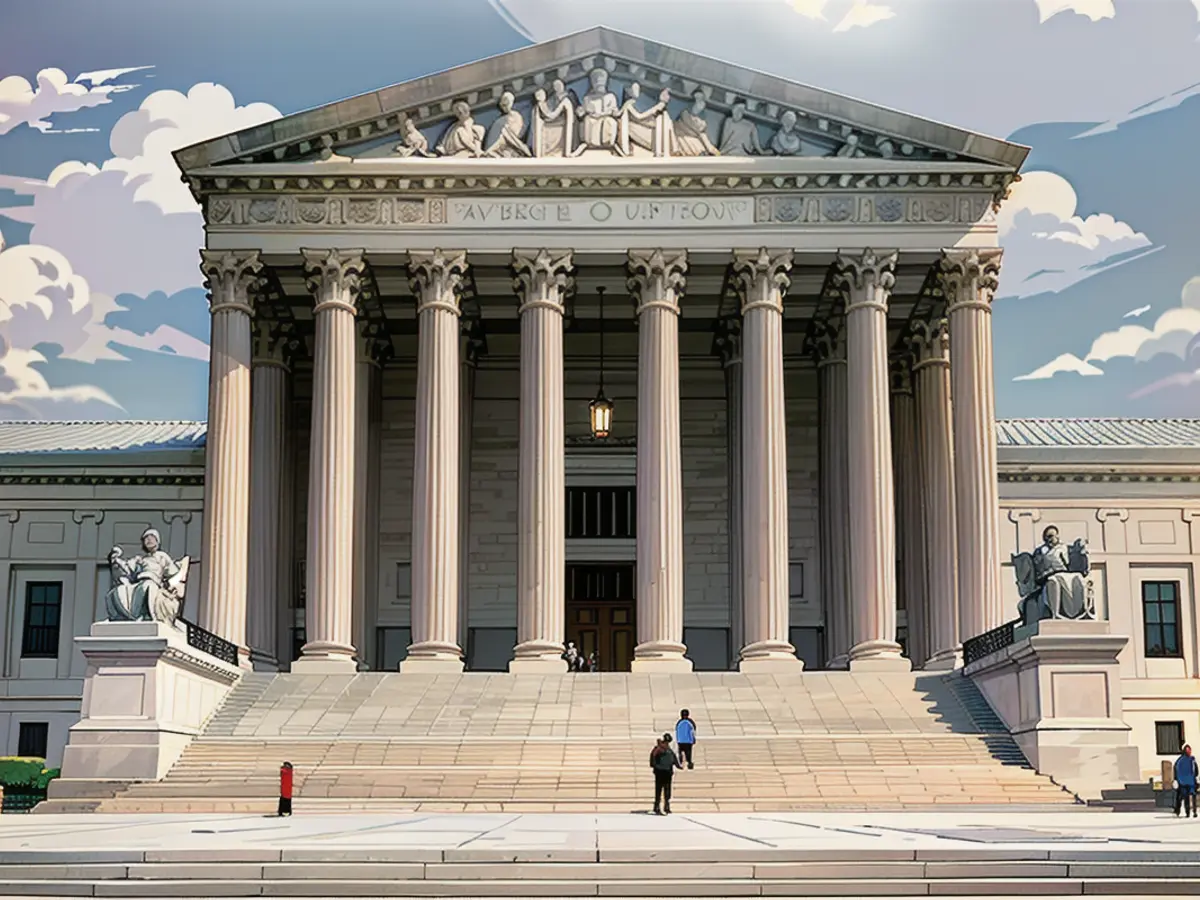Black voters achieve a significant triumph in Louisiana: some White voters perceive it as an assault on their personal dignity.
A recent court decision has brought new challenges for Louisiana, as a federal court ruled against the Republican-led state legislature for adding a second majority-African American district to the state's six-district congressional plan, leaving no congressional map six months before the election. Critics on the left argue that this clash could be another opportunity for opponents of civil rights legislation to undermine one of its remaining pillars.
The legal dispute could influence control of the U.S. House in the upcoming elections, as the second majority-Black district would likely vote Democrat. However, some Louisiana officials see themselves in a predicament, simultaneously trying to adhere to the Voting Rights Act's demands for protecting minority voting rights while respecting the Constitution's limitations on using race as a consideration.
The parties involved in the dispute will meet virtually on Monday to discuss the next steps in the Louisiana federal court that struck down the most recent congressional map. Black voters who aim to defend the second majority-Black district have indicated their intention to seek emergency intervention from the Supreme Court. This case follows a pattern of courts disagreeing with redistricting plans for discriminating against voters of color, only for those plans to stay in place due to procedural delays and legal strategies.
The outcome of this case will indicate the Supreme Court's stance on such legal maneuvers that prolong the resolution of redistricting disputes that occur after each census. At present, Louisiana lacks a congressional map. Senator Cleo Fields, a Black Democrat and former Congress member, one of those running in the new 6th Congressional District created by the state legislature, commented that the courts are trying to enforce the law but also disliking how it was enforced. He added that the situation makes it challenging to follow the law legally, but also avoid discriminatory practices.
Around a third of Louisiana's population is Black, but only one of Louisiana's six-member US House delegation is Black and a Democrat.
'Affirmative action in redistricting' claims
In response to the lawsuit filed by a group of 12 self-proclaimed "non-African American" voters, who asserted that they were racially stigmatized, stereotyped, and maligned by the map with two Black-majority districts, the court determined that constitutional equal protection was violated.
These voters claimed that the new congressional plan involved "affirmative action in redistricting, unseen in previous racial gerrymandering" cases. The state presented arguments supporting the lawmakers' motivations for wanting to protect certain congressional incumbents, but the two Trump-appointed judges disregarded those reasons. They stated that even if legislators were required to abide by the Voting Rights Act, this requirement shouldn't override the emphasis on standard redistricting principles, like geographical compactness and logical configurations.
Judge Carl Stewart, appointed by Bill Clinton, disagreed and suggested the court should've left the existing map in place. He noted that none of the plaintiffs demonstrated suffering discrimination based on race or even shared their racial identities with the court.
In a dissenting opinion, Stewart remarked, "none of the plaintiffs in this case demonstrated that (the map) had a discriminatory effect on them based on their race."
Paul Hurd, a lawyer for the challengers, called the map's harm on his clients one of "racial stigmatization." He did not reveal the racial identities of his clients but confirmed that the list included prominent White Republicans in the state.
Louisiana officials drafted the contested map in response to a lawsuit initiated by Black voters, who claimed the state's initial congressional plan violated the Voting Rights Act due to having only one majority-Black district. Attorney General Liz Murrill stated that she would request the court to allow the map passed by the legislature to be implemented in the elections, while also appealing the decision to the Supreme Court.
The issues surrounding redistricting have made it so inevitable for federal judges to draw up maps, according to Murrill. It's not ideal and the situation needs fixing.
Hurd, who has been successful in cases related to racial gerrymandering in the past, disagrees that the Supreme Court needs to address a lack of clarity in the law.
"The law isn't as unsettled as people make it out to be," he stated.
State lawmakers claim map was designed to protect incumbents
Those in support of the map claim that political reasons, not just race, were behind the actions of state legislators and Louisiana's newly elected Republican governor, Jeff Landry, who supported the new lines.
During a special session in January meant to create new congressional maps, lawmakers expressed their goal to safeguard their incumbents, particularly Mike Johnson, Speaker of the US House of Representatives, Steve Scalise, Majority Leader, and Julia Letlow, the sole female representative in Louisiana's congressional delegation.
They also sought to retain a seat belonging to GOP Rep. Garret Graves, who had endorsed Landry's primary opponent. Not surprisingly, Graves welcomed the recent ruling, stating, "The court's ruling speaks for itself. It's a very powerful statement."
Republicans involved with national redistricting argue that the push to shield incumbents and punish Graves doesn't prove that politics influenced the actions of lawmakers.
"All these debates about politics in this Louisiana case are secondary to why they had a special session," said Adam Kincaid, president of the National Republican Redistricting Trust. "The reason they had a special session wasn't to get rid of Garret Graves. The reason they had a special session was to draw a second Black majority district because they didn't want the judge to do it for them."
Issue of "gamesmanship" in eroding Voting Rights Act protections
Regardless of whether the Supreme Court decides to hear the case, the ongoing legal battle illustrates how "gamesmanship" can negatively impact the Voting Rights Act safeguards.
As Justin Levitt, a Loyola Law School professor specializing in elections and constitutional law, explained, "You don't need to strike (the law) down for it not to work."
In June 2022, Black voters claimed that Louisiana had breached the Voting Rights Act by creating only one Black majority district. US District Judge Shelly Dick – an Obama appointee and the chief judge of the Middle District of Louisiana court – ruled in favor of the plaintiffs, giving the legislature a deadline to redraw the maps.
The 5th Circuit dismissed Louisiana's attempt to delay Judge Dick's order, but the Supreme Court eventually stepped in. The justices accepted the case but agreed to postpone litigation until they ruled on a similar case in Alabama. As a result, the 2022 election in Louisiana occurred under the 5-1 map.
After the Supreme Court issued a verdict upholding its previous stance on applying the Voting Rights Act to redistricting cases in Alabama, the Louisiana case returned to the 5th Circuit. Instead of allowing Judge Dick to move ahead with her original order, the appeals court scrapped it and gave the state more time to redraw the maps, leading to the January session where the new map was approved.
However, when non-Black voters opposed this new map, they filed a lawsuit in the Western District of Louisiana, a more conservative federal court. Not only did the court limit the role of Black voters who sued over the 5-1 map, but it also denied their request to include the Baton Rouge proceedings in the record.
Marina Jenkins, executive director of the National Democratic Redistricting Committee, views this move as "forum-shopping" by the opponents of the map. Her nonprofit organization had aided the plaintiffs who won the case decided by Dick.
"Within days of the legislature passing the second majority Black district, you have these non-Black voters running to a super-conservative court in the Western District of Louisiana because they didn't agree with the decision that came out of the Baton Rouge-based court," Jenkins remarked.
Some have questioned why the legislature, during the special session in January, rejected other proposals that would have redrawn the districts in a more compact fashion adhering to traditional redistricting norms.
"There were several maps proposed that involved a bit of disruption to the incumbent protection scheme, but sometimes following the law means you don't get everything you want," Levitt said.
Fields, a former Democratic congressman pushing for a different map in an earlier round of redistricting, believes Louisiana requires resolution.
"Was this map my ideal choice? No. But it's the will of the legislature," he stated.
The longer this current standoff continues, the more delays and uncertainties await applicants, particularly Black Louisianians, according to him. Ultimately, he asserted that Black folks deserve the chance to choose their preferred candidate for the US Congress.

Read also:
- Year of climate records: extreme is the new normal
- Precautionary arrests show Islamist terror threat
- UN vote urges Israel to ceasefire
- SPD rules out budget resolution before the end of the year
Source: edition.cnn.com








